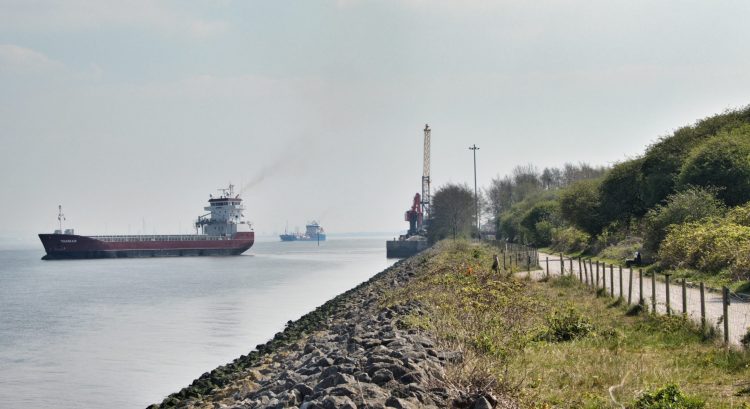An electric-powered cargo vessel and a ship-to-shore charging network form part of a £100m plan to create a ‘green corridor’ on the Irish Sea. Tony McDonough reports
Ships in the Mersey will have access to ‘clean power’ Picture by Tony McDonough
Port of Liverpool owner Peel Ports is partnering with NatPower Marine on a £100m project to push forward with the decarbonisation of shipping on the Irish Sea.
Working with Peel Ports, NatPower Marine will invest £100m in a network of ship-to-shore charging points. These will be installed at all Peel’s ports in the UK and Ireland including the Port of Liverpool.
In a process known as ‘cold ironing’, vessels will have access to ‘clean power’ when in port. This means they won’t have to rely on their own fuel while docked and reduce emissions. It will also cut pollution, a common complaint for areas around ports.
There are also plans for a ship powered by electricity to operate on short-haul routes across the Irish Sea, creating a so-called ‘green corridor’. Initial routes targeted by these proposals are cargo services between Dublin and Birkenhead and Belfast and Heysham.
Decarbonisation of shipping is seen as a significant challenge by the maritime sector around the world, similar to that faced by aviation. Both ships and planes require huge energy and don’t easily lend themselves to alternatives to fossil fuels.
In April Liverpool-based Bibby Marine awarded a contract that will see the construction of what it claims will be the world’s first zero-emissions windfarm support vessel.
A division of Bibby Line Group, one of Liverpool’s oldest family firms, Bibby Marine has led a consortium developing its groundbreaking maintenance vessel for several years. In September 2023 it secured £20m from the Government to support the project.
Although it hasn’t revealed the cost of its zero-emission electric commissioning service operation vessel (eCSOV), previous estimates have put the figure at between £40m and £50m.
NatPower Marine’s partnership with Peel Ports forms part of a larger £3bn investment to establish a global maritime charging network.
Chief executive Stefano Sommadossi said: “NatPower Marine is investing to deploy the largest global network of charging points to help solve the ‘chicken and egg conundrum’ facing this industry.
“Shipping lines cannot electrify their vessels if port charging infrastructure is not available, and ports are unable to raise capital for charging infrastructure without certainty of demand from shipping lines.
“With marine trade set to triple by 2050, we urgently need to build the global network of clean energy charging infrastructure the industry desperately needs.
“Our partnership with Peel Ports Group is the first step in this strategic approach to accelerate the adoption of clean energy in shipping and help cargo owners to reach net-zero.”
Green shipping corridors is a proposal that came out of the COP26 climate summit which took place in Scotland in 2021. The UK was one of multiple countries that signed up to the ‘Clydebank Declaration’, aiming to establish at least six corridors by the mid-2020s.
Image of Bibby Marine’s zero-emission electric commissioning service operation vessel
Short sea routes on the Irish Sea are seen as an ideal place to begin the push. Each year more than 3,000 vessels cross the body of water between the UK and the island of Ireland. They generate 230,000 tonnes of CO2 and 18,000 tonnes of sulphur oxide.
Peel Ports Group’s chief executive Claudio Veritiero said: “The proposals presented as part of this partnership are potentially game-changing, and fully support our ambitions to become a net-zero port operator by 2040.
“We look forward to working closely with NatPower Marine to explore the possibilities for establishing the first green shipping corridor between the UK and Ireland, and further enabling support for our customers, shipping lines and hauliers as they transition to a greener future.”
In March this year Peel Ports unveiled plans for a huge solar power project at the Port of Liverpool. This will see 63,000 solar panels installed generating up to 31MW of electricity.
It has teamed up with energy giant E.ON on the project which they claim will be the largest solar power project in the UK. It covers both Liverpool and Sefton and planning applications have been lodged with both councils.
The post £100m plan could see ‘electric ship’ on the Mersey appeared first on Liverpool Business News.




